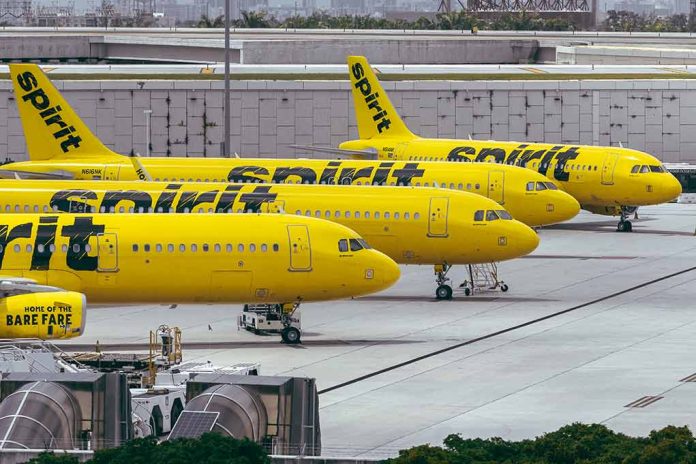
President Trump initiates a critical national security investigation into aircraft imports amid growing concerns that America’s $15.3 billion dependence on foreign aircraft parts threatens vital U.S. strategic interests and domestic manufacturing capabilities.
Key Takeaways
- The Commerce Department launched a Section 232 investigation on May 1, 2023, to assess if foreign aircraft, jet engines, and parts imports threaten national security
- The investigation could lead to new tariffs on commercial aerospace imports, expanding the existing 25% tariff on Canada/Mexico and 10% universal tariff on other nations
- The U.S. imported $15.3 billion in aircraft parts in 2023, with key suppliers including the UK, Canada, France, Japan, and Mexico
- This investigation continues the Trump administration’s focus on protecting domestic manufacturing, following similar probes into pharmaceuticals, semiconductors, and trucks
- Public comments are being accepted until 21 days after the May 13 Federal Register publication to shape potential policy responses
National Security Concerns Drive Investigation
The Commerce Department’s investigation, authorized under Section 232 of the Trade Expansion Act of 1962, stated by, “President Trump” broad authority to adjust imports through tariffs if they’re deemed a threat to national security. This move reflects growing administration concerns that America’s massive reliance on foreign aerospace components creates strategic vulnerabilities. The investigation will examine multiple factors including domestic production capacity, supply chain weaknesses, foreign subsidies, and predatory trade practices that disadvantage American aerospace manufacturers in the global marketplace.
Commerce Secretary Howard Lutnick is spearheading this initiative while simultaneously negotiating critical aerospace deals. The timing is significant as the administration balances protecting domestic industry while maintaining relationships with key allies who supply critical components. The investigation specifically targets commercial aircraft, jet engines, and related parts – sectors where the U.S. has seen declining market share despite having advanced technological capabilities and a skilled workforce that could be reinvigorated through strategic trade policy.
Global Trade Implications
This investigation extends the Trump administration’s assertive trade stance, which already includes a 25% tariff on imports from Canada and Mexico and a 10% universal tariff on other nations. The aerospace sector is particularly important as it represents both high-value manufacturing and national defense interests. While protecting domestic industry, these actions have sparked international responses, particularly from China, which has suspended Boeing purchases and returned 737 MAX jets in retaliation for American tariffs on Chinese products. This complex trade relationship affects multiple stakeholders across the global aerospace supply chain.
Despite these challenges, American aerospace manufacturing shows resilience. International Airlines Group recently announced plans to purchase 32 Boeing 787-10 aircraft with deliveries scheduled from 2028 to 2033. Additionally said by, Secretary Lutnick announced a $10 billion Boeing plane purchase by a British airline while negotiating a trade deal with the UK. These developments suggest that global demand for American aerospace products remains strong despite ongoing trade tensions and potential new tariffs that may result from the current investigation.
Strategic Economic Policy
The Section 232 investigation represents a broader administration strategy to revitalize American manufacturing across critical sectors. Similar investigations have been launched for pharmaceuticals, semiconductors, and trucks – all industries considered vital for both economic prosperity and national security. By examining foreign subsidies and trade practices, the administration aims to create a more level playing field for domestic manufacturers who have been disadvantaged by foreign governments that heavily subsidize their aerospace industries, creating artificial market advantages.
The public comment period, which opens 21 days after the Federal Register publication on May 13, provides an opportunity for industry stakeholders to present evidence regarding national security implications and recommend potential policy solutions. This approach combines executive authority with industry expertise to create targeted responses rather than one-size-fits-all solutions. The administration’s focus on securing supply chains for strategic materials and components reflects lessons learned from recent global disruptions that exposed vulnerabilities in America’s manufacturing capacity.
China Factor
China’s growing influence in global aerospace manufacturing adds urgency to the investigation. Their recently implemented export controls on aviation and aerospace parts could significantly impact U.S. imports if diplomatic relations deteriorate further. As stated by, “Trump administration” addresses these challenges, it must balance protecting domestic industry while maintaining access to global supply chains that remain essential for American manufacturing. This delicate balance requires nuanced policy approaches that distinguish between adversarial trade relationships and strategic alliances with friendly nations.
The investigation signals the administration’s commitment to rebuilding American manufacturing capabilities in strategic sectors while protecting national security interests. By addressing unfair foreign trade practices and subsidies, the Trump administration aims to create sustainable growth in domestic aerospace manufacturing that provides high-paying jobs while ensuring America maintains technological leadership in this critical industry. The results of this investigation could reshape global aerospace trade relationships for years to come while strengthening America’s manufacturing base.




